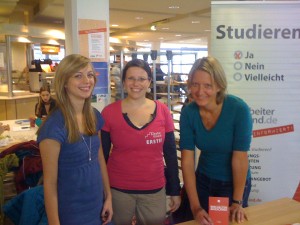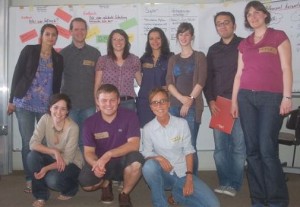Recognizing the challenges of first-generation college students
Four years ago, I founded a local chapter of ArbeiterKind.de in Mainz, the city where I studied. The non-profit organization ArbeiterKind.de supports children whose parents didn’t attend university as they pursue college degrees. After I read an article about ArbeiterKind.de, I decided that I definitely had to support the organization for two reasons.
First, in the article Katja Urbatsch, the founder of ArbeiterKind.de, described the typical challenges for children of non-academic families after they finish high school. Many barriers seemed familiar to me: The insecurity about the value of studying certain subjects, like the humanities. A question I struggled with in the beginning was: Wouldn’t it be better to work and earn money immediately after high school? Later, the confusion arising from the task of writing initial academic papers was tough for me.
Statistics quoted in the article and those following in the years to come gave me even more motivation to support ArbeiterKind.de. Results of surveys show that children of parents who didn’t earn college degrees are far less likely to finish their Abitur (the German high school certificate allowing students to enroll in a university). Even those who receive their Abitur decide to study at universities less often than the children of parents with an academic background. Scholarship programs may even aggravate the situation. They support gifted students financially, with seminars and a strong network, and they are co-financed by the German state. But only 30 percent of the students receiving a scholarship from the biggest German foundations have parents without an Abitur. These are just average numbers. In some foundations, there are only 10 to 20 percent! It is just impossible that talent, thirst for knowledge, and intelligence are prevalent at such a higher degree among children of academics than among children of parents who didn’t earn degrees or who have no Abitur.
So, I became angry: Something was going wrong in our educational system. And I saw an opportunity to do something against this inequality by supporting ArbeiterKind.de.
Many have found their very personal reasons for supporting our organization. ArbeiterKind.de has grown to more than 4,000 members. Moreover, ArbeiterKind.at was founded in Austria last year. To enable high school students to really decide about whether they want to study or not, we give them as much information as possible. Studying is no matter of course for children who are first generation college students in their families. They must justify why they want to study – just as kids of academics have to justify why they don’t want to study if they diverge from their family’s academic tradition.
My friends from ArbeiterKind.de and I go to schools and make presentations about the different possibilities for earning a college degree and financing one’s studies. I also post tips on Facebook daily. Moreover, we participate in fairs and events on education. Last but not least, we offer an online network where we answer questions and give information.
Many people put their minds to ease by pointing out that there aren’t any (or, in Bavaria and Lower Saxony, just low) tuition fees and that we have BaföG (student loans granted by the state). But this isn’t enough. Most importantly, BaföG can’t be regarded as a magic bullet. These loans don’t suffice to ensure equal chances in education. I will write more about BaföG and other support mechanisms at earlier stages in the German educational system in my next blog entry.





